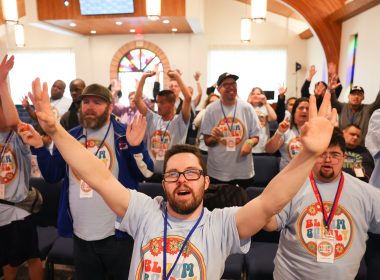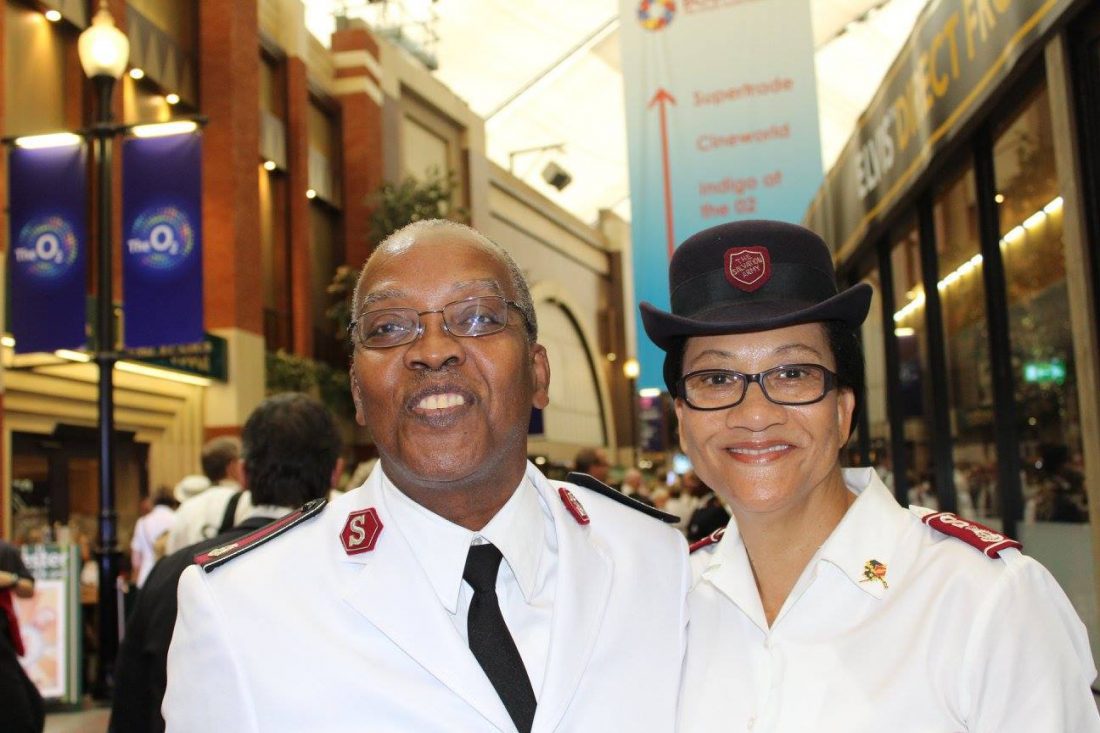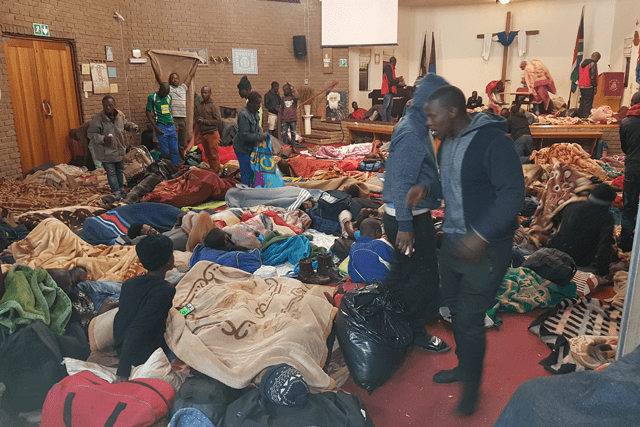Colonels Victor and Rose-Marie speak about the Army’s ministry in Nigeria.
By Karen Gleason –

Colonels Victor and Rose-Marie Leslie took up their current posts as leaders in The Salvation Army Nigeria Territory—as territorial commander and territorial president of women’s ministries, respectively—at the start of 2015. Here, they share about their ministry in Nigeria.
How was the transition from your previous appointments as chief secretary and territorial secretary of women’s ministries in the Caribbean to your current assignments in Africa.
Colonel Victor Leslie: We were shocked when the call came from the Chief of Staff appointing us as territorial leaders. Frankly, the place did not matter to us and we have been excited about Nigeria since that day. The role that I play in Nigeria is different from that of the Caribbean, but other than that, the people here are generally friendly, the weather is great, the music is rhythmic, the worship pulsating, and the food is delicious.
Colonel Rose-Marie Leslie: At the time we were coming, Ebola was a major concern and so were the threats of terrorism. However, not once did I feel that the Lord would not protect and provide for my husband and me.
Nigerian English is mostly spoken, although the four main local languages spoken by Salvationists—Hausa, Yoruba, Igbo and Ibibio—are the norm in village settings. I quickly learned phrases in the vernacular to greet our Salvationists, and have been improving over time, to the thunderous greetings by the congregations. I love the people, something I prayed repeatedly that God would help me to do.
What has surprised you the most about Nigeria?
RML: The love of Salvationist children and youth for God and The Salvation Army is a wonderful surprise. My husband and I believe that the youth play a critical role in shaping the society and in the delivery of the message and mission of The Salvation Army. We are trying to involve them proactively in taking leadership in framing the Army we are building today. At least 70 percent of the population of Nigeria is defined as “young people,” so we have great possibilities ahead of us.
VL: The imprint and impact of tribalism and ethnocentrism on the culture and progress of the country and the church have been my biggest surprise. The effects are ingrained in every aspect of society, creating a spirit of competitiveness and entitlement, and a convention of spiritual abuse, rather than a spirit of unity, compassionate leadership and partnership.
Yet, I believe change can come, as believers understand the culture of the cross in God’s will for the Army and its supremacy over our world/village/tribal cultures.
What are The Salvation Army’s main areas of social work and outreach in Nigeria?
VL: We have the basic models of corps community outreach with food and clothing services. More specialized treatment and surgical services are delivered from two hospitals; several eye, orthopedic, general wellness clinics; and a rehabilitation center for the disabled. We also have HIV/AIDS awareness projects, the intended outcome of which is to stop stigmatization of people living with HIV/AIDS as well as to empower clients to be self-sufficient.
RML: Education programs have been the bedrock of our social ministry to children and youth. Unfortunately, several years ago, the government took over all of our existing primary schools and the land they occupied. Still The Salvation Army has opened new schools to provide an avenue for less privileged and vulnerable children to receive quality education. In tandem with the HIV/AIDS projects, programs exist that address women’s health issues: family planning, care and support for pregnant women and those of childbearing age. We’ are also in the process of developing a response, in collaboration with the United Kingdom and Republic of Ireland Territory, to the issue of human trafficking victims deported to Nigeria from European countries after being trafficked. And we have a children’s home.
What particular issues are you addressing for the women of Nigeria?

RML: Male domination leads to wife beating, polygamy, child brides, illiteracy, lack of skill development, unemployment and preference given to males for jobs, child labor and abuse, human trafficking. As a result, self-sufficiency and accountability are core parts of our ministry to women.
In partnership with the USA Western Territory Women’s Ministries, we have a Rural Women Empowerment Project. Community development is the primary goal as individuals, families and cultural groups develop management skills using a product and process already familiar and common. Other self-help projects are developing locally and we are deliberately seeking opportunities to hire unemployed young Salvationists, who are college educated, and providing job training and empowerment for others.
How does the threat of terrorism—from the attack in Mali to the kidnapping of the Nigerian schoolgirls—impact The Salvation Army’s ministry?
VL: Nigeria, especially the north, is tormented by the persistent and violent attacks and militant oppression of the terrorist group called Boko Haram. Our school and officers’ quarters in Jos burnt down with the officers barely escaping death. Comrades have lost their lives, including the family of John Ezebuala and his three children, and many have lost their properties.
The Kano Corps is right in the midst of the hostile environment and so are around 12 other corps. The suicide bomb attacks and guerrilla tactics make life unpredictable for many of our officers and soldiers, who often have to abandon the cities and return to their native villages for months at a time during certain festivals and other high visibility events for their own health and safety.
RML: We visited the Northern Division for one week in September 2015 and drove into many areas that are under constant attack. We witnessed the courage and vitality, the faith and compassion of our soldiers and officers on the frontlines of the battle. They are the new heroes of the faith and a living testimony of God in their lives.
How does The Salvation Army help internally displaced persons (IDPs) in the northern part of Nigeria?
VL: In spite of the danger and risks, The Salvation Army has been the hope for many of the indigents affected by Boko Haram, Fulani Herdsmen and other terrorist groups. Since the current insurgency started in 2009, The Salvation Army has responded to the needs of over 500 affected families in Maiduguri (Borno State), 250 families in Jos (Plateau State), and 150 families in Bauchi (Bauchi State) with food items and basic survival essentials. Since then, the local corps officers have visited various IDP camps providing counseling and spiritual care.
In an active terrorist environment, the needs of the refugees are continuous, although the availability of funds limits our work.
What are the Army’s most immediate, short-term goals in Nigeria? How about long-term goals? The Salvation Army in Nigeria is approaching its 100th anniversary.
VL: Self-sufficiency is a main goal. In terms of human resources in the context of a strategy for ministry expansion, we currently have more corps than available officers. So, for the first time in our history, we welcomed a dual session of cadets, adding the Joyful Intercessors to the Messengers of Light in order to be self-sufficient in manning our corps and societies with trained personnel. We have also voluntarily decided to decrease our financial dependence on IHQ and are looking at best practices to design local entrepreneurial and self-employment opportunities. We are therefore interested in learning more about the Mission Development concepts spearheaded by the USA West in other parts of the world.

RML: Leadership development is another short-term goal. This year we appointed a national as our secretary for business administration. We also added a property secretary and education secretary. The officers selected for these positions are proving that the right decisions have been taken to develop and use the abilities that have been latent for a substantial period. We have gifted officers but many need professional training, or simply exposure.
VL: Our short-term goals are linked to longer term outcomes. Nigeria has a population of 175 million and we have 18,680 soldiers. We believe that with visionary leadership and strategic planning, by the year of our centenary, 2020, we can have 35,000 senior soldiers.
Is there anything else you’d like New Frontier Chronicle readers to know?
VL: The news is that Nigeria has the reputation of inbred corruption and inventive scams, kidnapping, crime, terrorist activity and lack of security. Nevertheless, there are quite a number of positive realities. Nigeria is a richly rewarding cultural experience and the diversity of cultures makes for consistently interesting discoveries. The Salvation Army in Nigeria aims to offer peace, development, hope and healing for our nation as we faithfully follow the kingdom agenda.
RML: The fields are truly ripe for harvest. We believe that even in the midst of the conflict, “victory is secure, for the truth unchanging makes the triumph sure” (SASB 707). The Army in Nigeria is “attempting great things for God and expecting great things from God” (W. Carey paraphrased). Please pray for our officers and Salvationists, the church and its leaders, for the people of Nigeria, and the government.










Thank God for the progress so far, t.comander & his wife has great mind and passion to reach peo ple.God wil empower them and all their team nation wide,Amen.
These two people are the most caring and loving people I have met in my life.